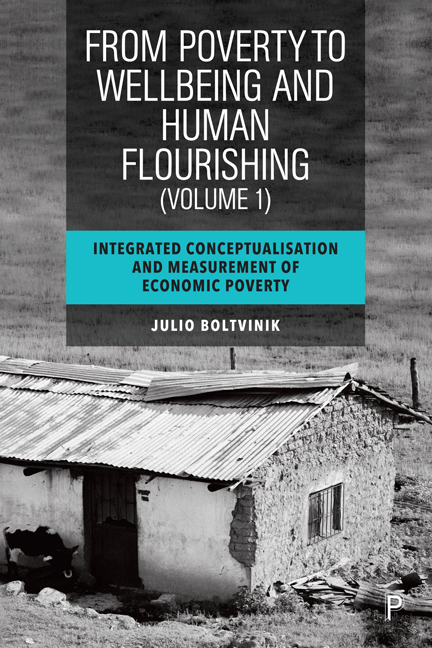 From Poverty to Well-Being and Human Flourishing
From Poverty to Well-Being and Human Flourishing Epilogue
Published online by Cambridge University Press: 28 March 2024
Summary
One can add plenty, or just a few words at the end of a complex book. I am happy to have got to the point of writing this Epilogue. I am also happy with the book’s structure, which has at its centre the distinction between poverty conceptualisation (Part I) and measurement (Part II), and the view that measurement ought to be based on conceptualisation. All too often, this ought to is not observed in poverty studies. For instance, the World Bank (WB) identifies the lowest PLs used in the world and averages them to obtain what it calls the IPL (International Poverty Line), which it then uses to measure poverty in peripheral countries. According to Reddy and Pogge (2020, p 43), the ‘bank’s estimates of the level, distribution, and trend of global poverty are marred by three serious problems’, the first of which is the one that interests me now: ‘The bank uses an arbitrary IPL that is not adequately anchored in any specification of the real requirements of human beings’ (emphasis added). One could say that the WB does not comply with the abovementioned ought to because it excludes any kind of conceptualisation. Another very different example of a text that does not fulfil the normative statement that measurement should be based on conceptualisation is Altimir (1979): after thoroughly analysing the concept of poverty, and the relations between poverty and basic needs, in chapters 2 and 3, with arguments that clearly point to a multidimensional PMM and multiple human needs, the author adopts a one-dimensional PMM that reduces the WBS to income and recognises only one need, food. Chapter 6 discusses ECLAC’s procedure in more detail. Moreover, this procedure is the core object of a very detailed empirical and simulation-oriented research in Boltvinik and Damián (2020).
This distinction also involved breaking the narrative on principles (P) and good practices (GP) into two chapters, each of them in a different part of the book. This felt slightly forced at times, since the dividing line between what constitutes conceptualisation and what constitutes measurement can become blurry on occasion. However, I think that all in all it benefitted the book.
- Type
- Chapter
- Information
- From Poverty to Well-Being and Human FlourishingIntegrated Conceptualisation and Measurement of Economic Poverty, pp. 213 - 218Publisher: Bristol University PressPrint publication year: 2023


